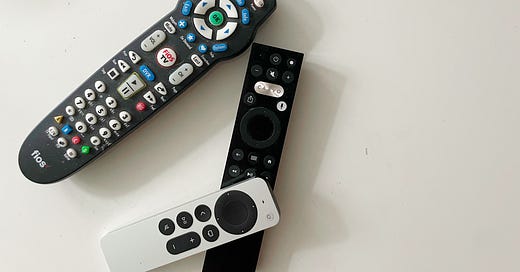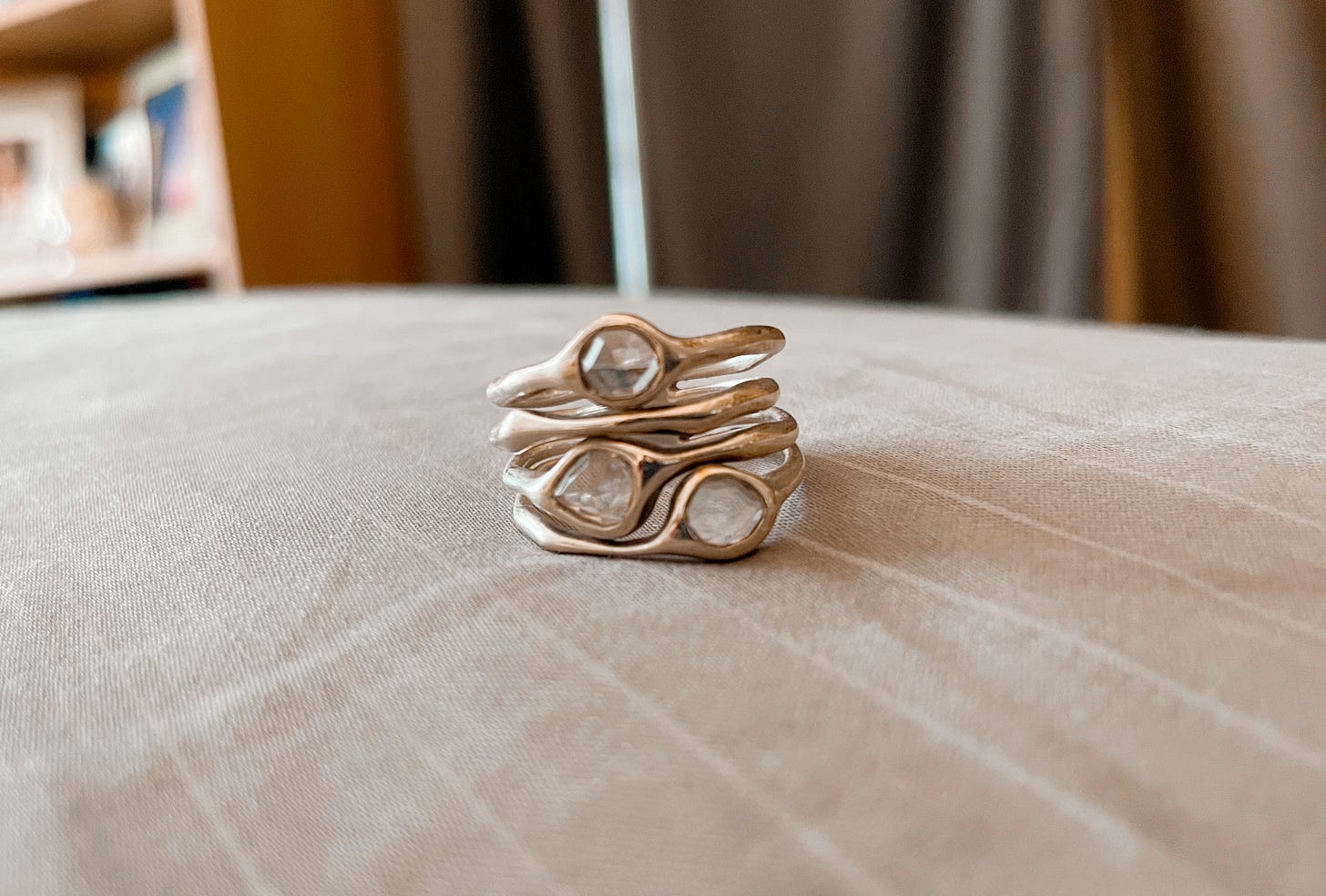Slowly back away from the TV news...
"It took me time to learn that knowing about important, newsworthy issues isn’t the same as immersing yourself in the repetitive non-information demanded by the 24/7 news cycle."
The final push came one night as the 2020 election season kicked into high gear. My partner turned to me, a bit wistfully, saying, “I feel like I’ve lost you a little to MSNBC.”
Oof.
That hit hard.
He wasn’t scolding me. He was simply observing the turn my life had taken for the past four or five years. And he was right.
“A f*ck ton of news consumption.”
Over the past couple of years, I’ve cut down my TV-internet-social news consumption to, well, roughly 5% of what it was during the dark days of The Former Guy.
Friends, it was a f*ck ton of news consumption.
I didn’t step back because things are “fine” now (they’re not), but because it wasn’t healthy for me. But that was tough.
I felt for a long time that if I were not on top of absolutely detail of everything — every breaking news story, every new Congressional vote, every act of horror out of DC, every act of sexism and racism and violence — that I was “tuning it out.” Turning away. Burying my head in the sand.
Even “enjoying my privilege,” as I’ve seen it put.
I didn’t want to be that person. Broadening our knowledge and understanding about the world around us so we can work to improve it is something I really value.
It took me some time to learn that knowing about important, newsworthy issues — and ideally acting on them in productive ways — isn’t the same as immersing myself in the repetitive non-information demanded by the 24/7 news cycle.
(Like, how many times can the chyron say BREAKING when they’ve been talking about the same damn half-baked story for the better part of two days? Can we create some common sense guidelines around the use of BREAKING, already? Sheesh.)
Drowning in an endless swirl of non-information
I love this ring my children gave me. They told me that each stone stands for the three things I love: “Feminism, being a mom, and yelling to Jon to tell him to come in and see what’s on Rachel Maddow.”
Have you ever even noticed that sometimes you click a headline that takes you to a reputable online news source, only to learn there is no original reporting? It’s just a summary of someone else’s reporting, with a link that says “Read the full story on the Washington Post.”
How much time do we spend reading stuff like that? Well for me, it was a lot.
We talk a lot about misinformation and disinformation, but we are also caught in an endless swirl of non-information.
We crave more information than is available to us, and so we sit/click/refresh, eagerly, waiting for it to come. We’ve become programmed to do this because it benefits news organizations to keep us sitting, keep us clicking, keep us refreshing the feed to see what details comes up next.
It may be giving us dopamine hits, but it is not in fact giving us more knowledge.
Also, at least for me, it was exhausting. I have the eye bags to prove it.
It’s so easy to think that because you’re tuned in all the time, that you are involved. You are engaged.
It’s easy to mistake watching for understanding and to believe consuming is some kind of action.
(And let me be clear — using your social and IRL networks to amplify important voices, untold stories, voting information, activism opportunities is action. I hate the disparagement of “armchair activists” because first, not everyone is financially, physically, or otherwise able to get out and knock on doors. And second, I assure you, there’s a lot you can do from an armchair!)
I am a stellar target for this kind of media system that preys on our curiosity, because I can’t help but want to know everything about everything. I’m a data nerd, a researcher, an insatiable knowledge-seeker and devourer of information, both useful and not so much. I am an egregious over-liker on Twitter. (Or, well, I was.) I bookmark articles, videos, social media posts all day long.
If “big media” had to design a perfect consumer, Weird Science style, it just might be me! Not sure if that’s good.
Here’s what I changed, and how I did it.
So how did I wean off my arguably unhealthy news consumption habits? Well, it helps that Rachel Maddow is only on Mondays now.
I also made changes like these:
I turned off news alerts on my phone. If it’s big, someone will text me.
I get no social media notifications, and never have.
I moved the Twitter app off my iPhone home screen dock.
I now start my morning listening to NPR Up First while I get ready, for a good 10-minute summary of the day’s big events (including those ignored elsewhere). If I only have 5 minutes, I listen to NPR News Now.
I weaned off a 20-year habit of having TV on “in the background” when I’m done with work. If I need “company,” I turn to podcasts, audio books, music, or nothing.
I subscribe to more independent journalism for deeper stories and thoughtful perspectives, including Pro Publica and Mother Jones.
I subscribe directly to the newsletters of the columnists I appreciate, like Charles Blow of the NYT or Karen Attiah at the Washington Post so their work goes into my inbox. (It can be hard to find — try Googling “newsletter” and the person.)
I also get information, thoughtful perspectives, and intellectual honesty about current events from plenty of Substacks including
, , , , ,, , , , .
So, like, that’s still a whole lot of good information I get! More than most people, I bet. It’s just not 24/7, it’s less about TV news, and it’s not taking over my life.
Priorities: The final frontier.
The best result of all of this, is that I’ve able to find more balance (ugh, that word, I know) and fill those hours with more things that matter to me:
Relationships.
Kids.
Friends.
Activism.
Meaningful work.
Really good scripted television.
Nothing, sometimes.
A little more cooking, a little sushi delivery.
Reading books.
Writing. (Hi!)
Funny enough, with less “news time” in my life, I’m no less informed. I’m no less interested in the world around me. I’m no less able to carry my own in a conversation about the debt ceiling or The Tennessee 3 or the Meta layoffs or despicable daily assaults on the LGBTQ+ community or the new (ill-conceived) bill to keep kids off of social media regardless of parental approval.
In fact, now I have more time to process all the things that are happening, and to be more thoughtful with my actions and reactions to them.
I also have more time to sit with my teens, get their perspectives on the issues of the day, and find out what matters to them, from politics to school gossip, social media, gaming lore, new music drops, media and whatever they’re binge-watching these days.
One thing that’s clear: discussing The Former Guy over dinner isn’t nearly as fun as discussing The Family Guy.






I think you know I get this...boy do I get this.
Yes to all you said. Especially the last graph about more time sitting with your teens, getting their perspective. Recently my son (who is long past being a teen) commented to me that the problem with “old” people not being willing to step aside at retirement age isn’t that they aren’t smart, committed, engaged, experienced, or actually wise. Many of them are, indeed, all those things. The problem is that many no longer have perspective necessary for a rapidly changing world. Of course, that isn’t what you’re talking about in this piece but I thought of it because talking with your teens is helping you maintain perspective on a world that will eventually be theirs. A world where we can be the mentors, the sounding boards, the advisors, the listeners, rather than being the Fri t line leaders. We need to pass on leadership to the youngers.